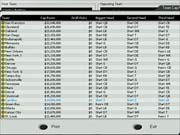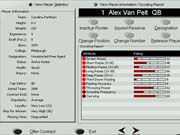To the casual pro football fan, it would seem there's not a whole lot worth paying attention to between the end of the Super Bowl and the start of training camps in the summer. Sure, the draft can be exciting, especially now that ESPN and sports-talk radio shows have decided to dedicate a week's worth of coverage (or more) to it. Other than that, though, the sports world is dominated by hoops, hockey, and baseball from late January to June. But the truth is that it's during the gloomy days of winter and early spring that winning franchises are built: Coaches are hired and fired, scouts put rookies under the microscope at the NFL combine, contracts are renegotiated to meet salary cap constraints, and longtime veterans ponder retirement. And it's precisely these sorts of things that lie at the heart of Front Office Football 2001, the long-awaited sequel to 1999's Front Office Football from independent publisher Solecismic Software. Published by EA Sports and available only via download, this text-based sim features several noticeable enhancements on the formula established by its predecessor, and it's easily the game of choice for football fanatics who want to micromanage every aspect of their favorite teams' operations.

Despite the name, Front Office Football 2001 kicks off with the 2000 season. You can begin your career with rosters from last summer or create entirely new rosters through a player allocation draft. This is a godsend for fans of teams like the Bengals or Chargers, who can't work themselves out of the depths of awfulness in a single season--just prioritize the various types of players (quarterbacks, defensive linemen, linebackers, running backs, and so on) and cross your fingers as the draft begins. Though preseason games are when roster cuts are being made, there's no way to access statistics for these outings--you instead must scroll through your roster and take note of the ratings in a variety of attributes when making your decisions.
This is obviously a minor point for users who let their scout (only one) and coach (also only one) manage their roster and depth charts, but even higher-paid cyberassistants can give you strange feedback. For example, after Daunte Culpepper went 21 for 29 with three touchdown passes and had a passer rating of 119.3 in a game, the scout reported that he was "fairly concerned" about my starting quarterback. This was a warning he repeated throughout the year even though Culpepper finished fourth in QB rating at the end of the season. In short, you should jump in and get your hands dirty with everything from molding the depth chart to creating offensive and defensive game plans.
Speaking of game plans, you'll find you can craft quite a comprehensive strategy for your team to follow. Should you feel up to the task, you can set an impressive array of parameters: How frequently you'll run or pass based on down and distance, how often your offense will run at each of the seven holes (left tackle, left end, center, and so on), passing distances, blitz frequency, types of pass coverage, offensive formations, and much more. There are still some problems--for instance, the game doesn't differentiate between 11 yards to go for a first down as opposed to 20 or more, and there's no provision to change playcalling tendencies when the ball's in the shadow of your goalpost--but all in all, the system works pretty well. And should watching the text-based play-by-play reveal that bad decisions are being made, there's an option to jump in and call the plays yourself.
As in real-life football management, the biggest challenge in Front Office Football 2001 isn't creating a solid game plan or even putting together a winner for a single season--it's trying to maintain a level of excellence over the years while staying under the salary cap. To do this, you'll have to scour the wire for free-agent bargains, coax other teams into trades, and renegotiate salaries with veteran players. The trading model has been vastly improved for this edition, letting you offer a combination of up to five players and draft picks. You're also responsible for adjusting ticket prices and making pitches for stadium renovations, and if things really start going south, you can try to move your franchise to a new location.

Perhaps the only thing holding Front Office Football back from true greatness is its interface. Rather than having menu selections at the top of the display like you'll find in every other Windows application, for some reason, they're found at the bottom. It's very disorienting, as is the fact that individual windows can't be maximized to fill the entire screen. It's irritating enough that you must scroll like mad to view all the available free agents, but reading a scouting report crammed into a teeny box can be especially frustrating. To be fair, scouting reports can be printed out--but it'd be much easier to simply maximize the window and see all the info at once. The interface does everything it's supposed to, but after wrestling with it for several days, you can't help but get the feeling that more could have been done to guide you through the myriad of tasks you face.
You'll find a few other anomalies as you stick with the game--a fullback missing 10 weeks because of "tobacco withdrawal syndrome," a team with a 14-2 regular season record sending only one player to the all-pro team, and no options of any kind for multiplayer games--but the good news is that Front Office Football 2001 is so engrossing that this won't bother you one bit. If you don't mind rolling up your sleeves and investing some serious time in learning all of this game's nuances, you'll undoubtedly get your money's worth and then some out of Front Office Football 2001.